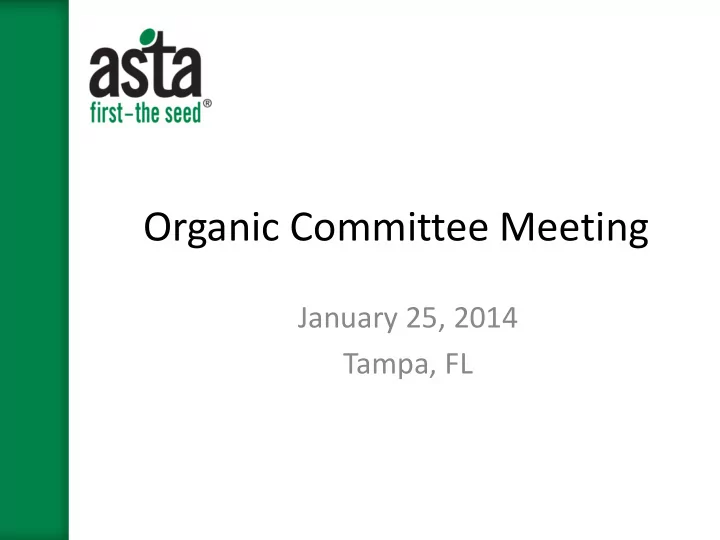

Organic Committee Meeting January 25, 2014 Tampa, FL
ASTA Antitrust Compliance Policy Statement It is the policy of ASTA to comply strictly with the Federal and State antitrust laws. ASTA’s policy and guidelines, to ensure compliance with both the letter and spirit of the laws, are set forth in ASTA’s bylaws. The antitrust laws prohibit combinations or conspiracies in restraint of trade. This means that competitors may not legally agree to conduct that inhibits competition. Anticompetitive agreements may be inferred from discussions about sensitive topics. Because trade associations like ASTA bring competitors together to address industry concerns, we must be especially careful not to agree to actions that might be interpreted as anticompetitive. It is ASTA policy to have written agendas for all meetings, to have legal counsel present where sensitive issues might be discussed, and to prepare minutes of all meetings. This applies to all meetings held during a conference hosted by ASTA. If you have any questions about the proper scope of any ASTA meeting, or the Association’s antitrust compliance policy, please raise it with the meeting chairperson or member of ASTA staff.
USDA-National Organic Program • National Organic Meeting with Miles McEvoy – Mexican Untreated Seed Protocol – Madison Project Overview – Education on U.S. seed industry • Action Item: Provide information for US- Mexico organic meeting
NOP Meeting Continued • Clarification on how SAGARPA will require companies to petition to be added to the list of approved importers; • How SAGARPA will require companies to petition to add seed varieties to the approved seed list; • What the requirements will be for importing the seed – where it will be held; how it will be tested; what it will be tested for; how long the process is anticipated to take; etc.; • Where the petitions will need to be sent; • Does SAGARPA anticipate being able to do any of this in the US prior to shipping (if we do it in an AMS certified lab and maintain chain of custody.
Equivalency in Brazil • ASTA delegation in December met with new Minister Councilor in Brazil – Clay Hamilton • A priority for the Minister Councilor is U.S.- Brazil organic equivalency • This is a long term goal for his tenure in Brazil • ASTA will provide support whenever possible
USDA-Agriculture Marketing Service • AMS had a stakeholder meeting on Jan 12 th – AMS is pleased with the Organic Seed Finder Database – Will include seeds in organic bilaterals – Potential NOP stakeholder meeting in 2015
Mexico Update: Importation of Untreated Seed Protocol Organic Seed Committee ASTA Vegetable and Flower Seed Conference, Tampa, FL January 25, 2015
Importation Protocol • Presented at a US/Mexico phytosanitary workshop last September, Puerto Vallarta • Considered to be equivalent to SAGARPA’s phytosanitary treatment requirements • Seed shipments will be retained at port of entry until laboratory testing is completed with negative results
Vegetable Species Currently Included in This Protocol: Chicory (Cichorium imtybus) Onion (Allium cepa) Celery (Apium graveolens Broccoli (Brassica oleracea var. Italica) Cauliflower (Brassica Oleracea var.botrytis) Hot pepper (Capsicum annuum) Cucumber (Cucumis sativus) Leek (Allium porrum) Chives (Allium fistulosum) Beet (Beta vulgaris) Cilantro (Coriander) Carrot (Daucus carata) Tomato (Solanum lycopeersicum) Spinach (Spinacia oleracea)
Application and Import Procedure • Seed company sends an application to AMSAC; AMSAC forwards to General Directorate of Vegetal Health (DGSV) • DGSV then notifies the Directorate General of Phytosanitary Inspection (DGIF) • Approval of participation (registration) in the program comes back to the company through AMSAC
Application and Import Procedure, con’t • The registered company must obtain permission to import through the Mexican Foreign Trade Digital Window (VDMCE) • Enter assigned control # and indicate that the import of seeds will be conducted under the official procedures for organic production so it can be identified by DGIF. • Samples will be officially collected at the POE and held until it is analyzed
Companies Currently Registered in the Program: Enza Zaden Bejo Seminis Grupo Sakata de Mexico Keithly Williams Mar Seed Syngenta Harris Moran Rijk Zwaan Mexico Promotora Agricola El Toro Nunhems Mexico Ahern Internacional de Mexico Martha Luisa Velez Salomon
Phytosanitary Issues • Last US/Mexico Phytosanitary Workshop, Puerto Vallarta: – Harmonization of Seed Testing methods – Pest Listing/PRA – Importation of untreated seed into Mexico • Next Step: obtain agreement via U.S./Mexico technical bilateral meeting (early 2015) • New APHIS seed czar: Michael Perry
Lista de plagas: México Pepper Mild Mottle Tobamovirus Chile Clavibacter michiganensis subsp. michiganensis Tomate Xanthomonas campestris pv. campestris Brasicas Acidovorax avene subsp. citrulli Sandía Cuscuta Alfalfa Pantoea stewartii Maíz Alternaria brassicicola Brasicas
Pest List: United States › Cucumber green mottle mosaic virus (CGMMV) › Wheat blast (Magnaporthe grisea (M. oryzae Triticum pathotype) › Potato spindle tube viroid (PSTVd) › Harpophora maydis (corn wilt) › Corn downy mildews › Apical stunt viroid (tomato) › Seed transmitted pathogens not known to occur in the U.S. (to be determined)
Pepper Mild Mottle Virus • Companies grow pepper seed off shore, test (via ELISA/PCR) • If seed tests positive, companies treat the seed, then retest using biological (bioassay) method • When seed tests negative, the proteins (although inactivated) remain. • If the company wants to ship to Mexico, and the seed is retested with ELISA/PCR, the seed will likely test positive (false positive)
Pest Listing Project • Ongoing with ISF • ASTA is programming funds in the UES to support the development of more pest lists: – Retired industry and university experts – Students • Pest lists are needed for the new international seed standard under development • Pest lists will support the rapid development of PRAs and help resolve bilateral disputes
Thank You! rdunkle@amseed.org
Recommend
More recommend